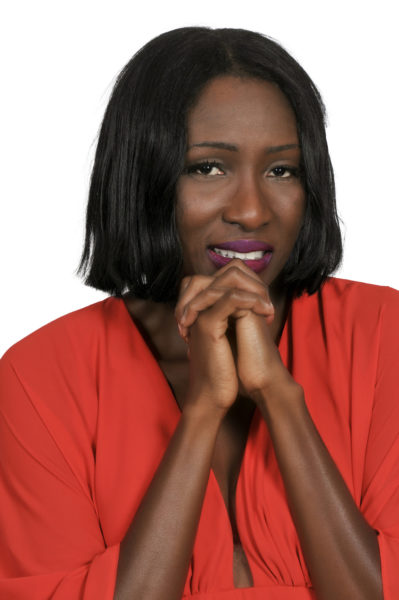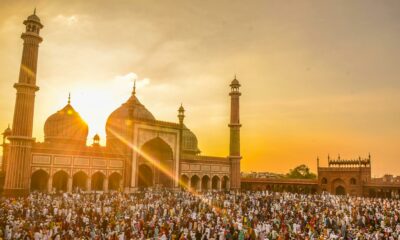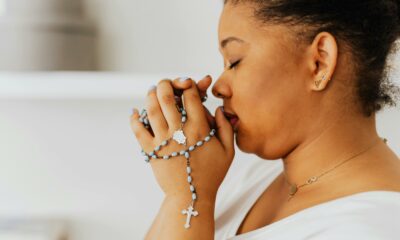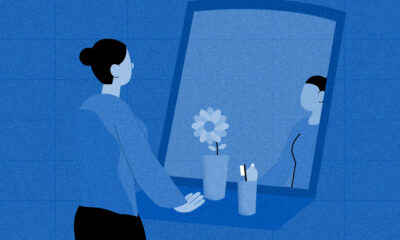Features
Lola Gani-Yusuf: The Burden of Growing Up in a Mixed-Religion Household
 I was born into a family that didn’t really practice any form of religion. My father, though born in a strong Muslim home, was a non-practising Muslim. My mother, on the other hand, is what you would call a product of an interfaith marriage – born to a Christian mother and a Muslim father. After her father’s death, she became the step-daughter of a Christian (who to this day is the maternal grandfather I feel ever privileged to have.)
I was born into a family that didn’t really practice any form of religion. My father, though born in a strong Muslim home, was a non-practising Muslim. My mother, on the other hand, is what you would call a product of an interfaith marriage – born to a Christian mother and a Muslim father. After her father’s death, she became the step-daughter of a Christian (who to this day is the maternal grandfather I feel ever privileged to have.)
At home, we had both Bibles and Korans in my father’s study. In fact, I never saw either of my parents go to Church or Mosque. As a result, I grew up celebrating both Christian and Muslim holidays. Although, this meant new ‘aunty-give-me-cake’ dresses anytime religious holidays were celebrated, it further fuelled my religious ignorance. At the time, I was living the carefree life of a naïve little girl who had not grasped the role religion would play in her adult life. Let us just say my naivety was such that I thought both religions (Christianity and Islam) were one and the same until my first term in a Catholic secondary school.
On the other hand, my friend, Eniola, did not have it so easy. Although her mother grew up in a strong Christian home, she fell in love and married a man from a practising Muslim background. According to Eniola’s account of the story, her dad was not a practising Muslim until he seemed to have everything in order – family, children, career, and the life he had always dreamt of. No sooner did he achieve a certain level of ‘success’ than he felt the need to be more religious and started practising his Muslim faith. As such, Eniola’s mum was forbidden to take their children to church – because he wanted his children to practise Islam.
It became the war of religion at home as Eniola was caught in the middle of her parents’ battle over whose religion was supreme or what faith the children should learn. Eniola’s mum was a deaconess in church, and Eniola could see the hurt in her mother’s eyes because her children could not follow her to church. Eniola also saw the pride in her father’s eyes on the day of her Koran recitation, and when she started covering up her hair (a common feature among practising Muslim women).
In spite of this, she still felt like she was missing out on her mother’s love and religion. When she had the opportunity to travel out of the country for her master’s degree, she found comfort just in knowing that she was far away from choosing whether to go to the mosque on Fridays or to Church on Sundays. She decided that it was best if she didn’t identify with either of the two religions. For once, it was easy not to have to fight for the love of either of her parents. Besides, she couldn’t get herself to choose between being a Muslim or a Christian because no matter how hard she tried, it felt like she was betraying one of her parents.
The burden of religion is one which many Nigerian children growing up in mixed-religion households have to bear. If you are born into a mixed-religion but liberal family (where both parents are not so particular about whose religion their children adopt), then it is easy for children to grow up and pick up whatever religion they have strong convictions for. But should you be born into a home where two religions are practised and it is a case of ‘I shan’t agree’ or a tug of war over whose religion the children must practise, chances are the children will be caught in a lifetime of battle over which religion to practice until such a time when they are mature enough to choose one. In this part of the world, it may be until you leave your parents’ house (and this may be a long time coming if you are female).
Whatever the case, I hope millennials can take a different approach and not repeat our parents’ mistakes by deciding earlier on (even before they go into relationships) if religion will be a relationship deal-breaker for them or not. So if you consider yourself a ‘religious’ person now or perhaps you have the foresight of you becoming a very ‘religious’ person when you reach middle or retirement age, then for the love of your unborn children, date or marry someone who shares similar religious doctrines as you. Don’t fool yourself into believing that your spouse will convert to your religion after you get married or that both of you will live “happily ever after” in spite of practising two different religions under the same roof. I am learning that when it comes to long-term partnerships like marriage, it pays to stick with your kind. Or what do you think?
Photo Credit: Robert Byron | Dreamstime.com





















